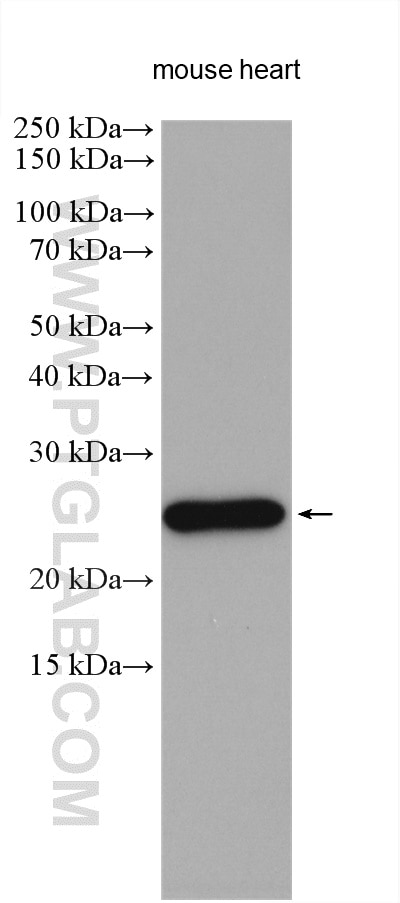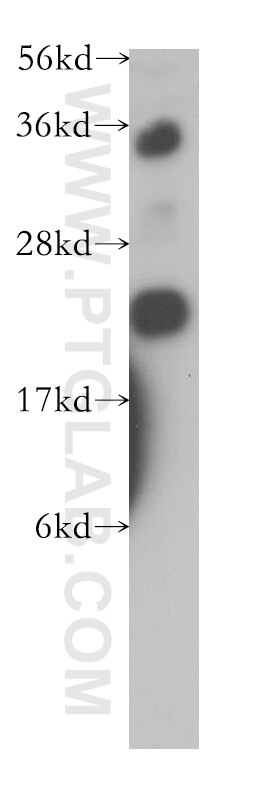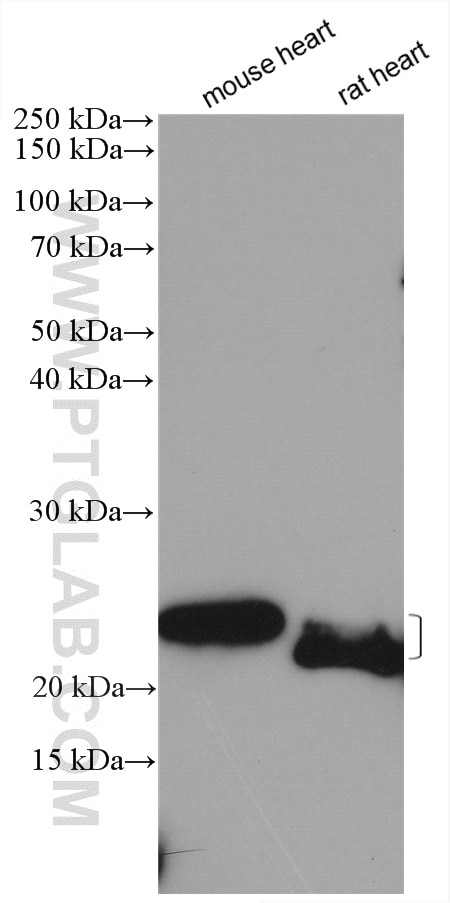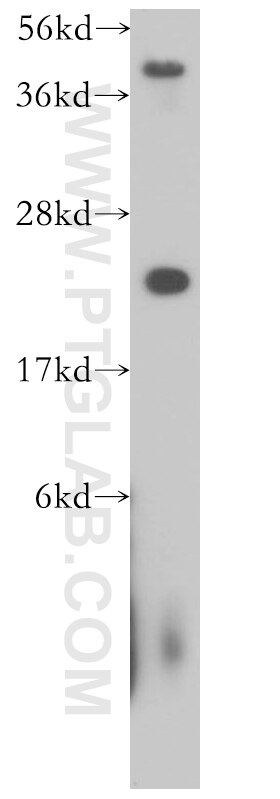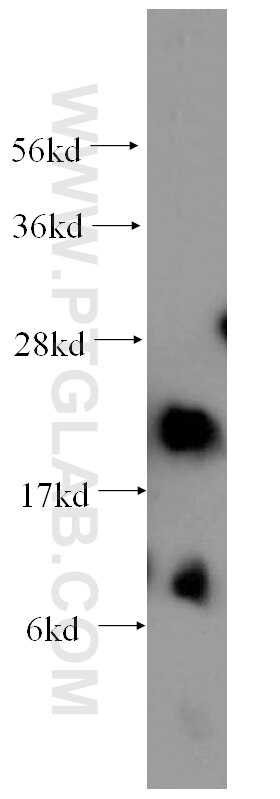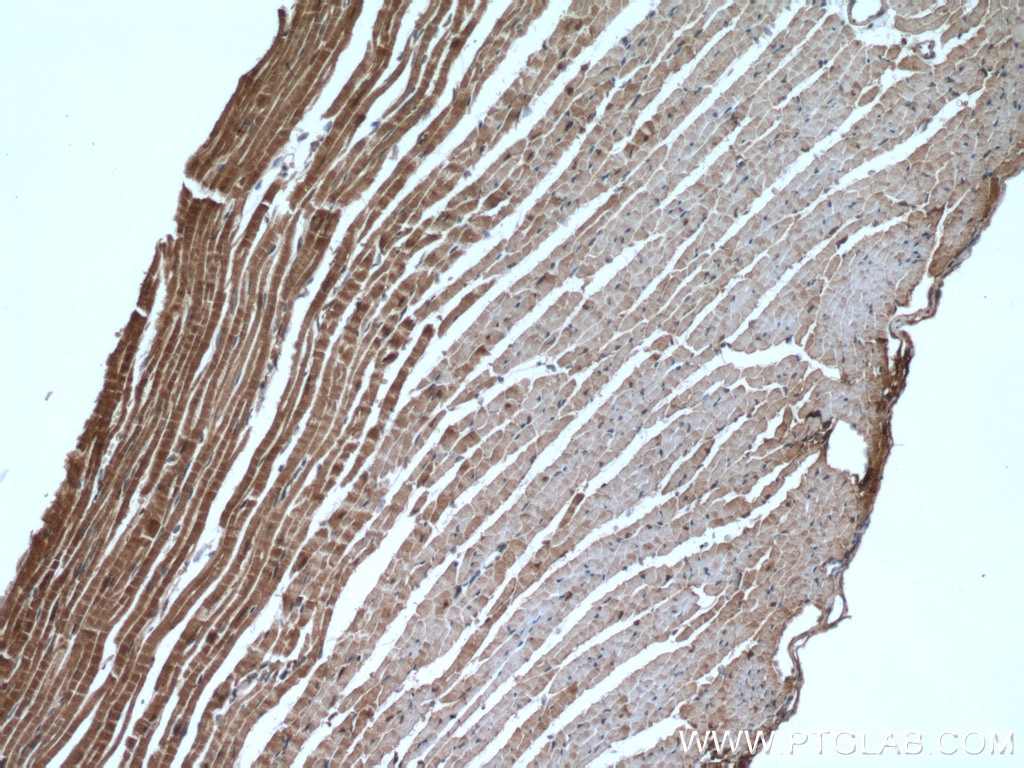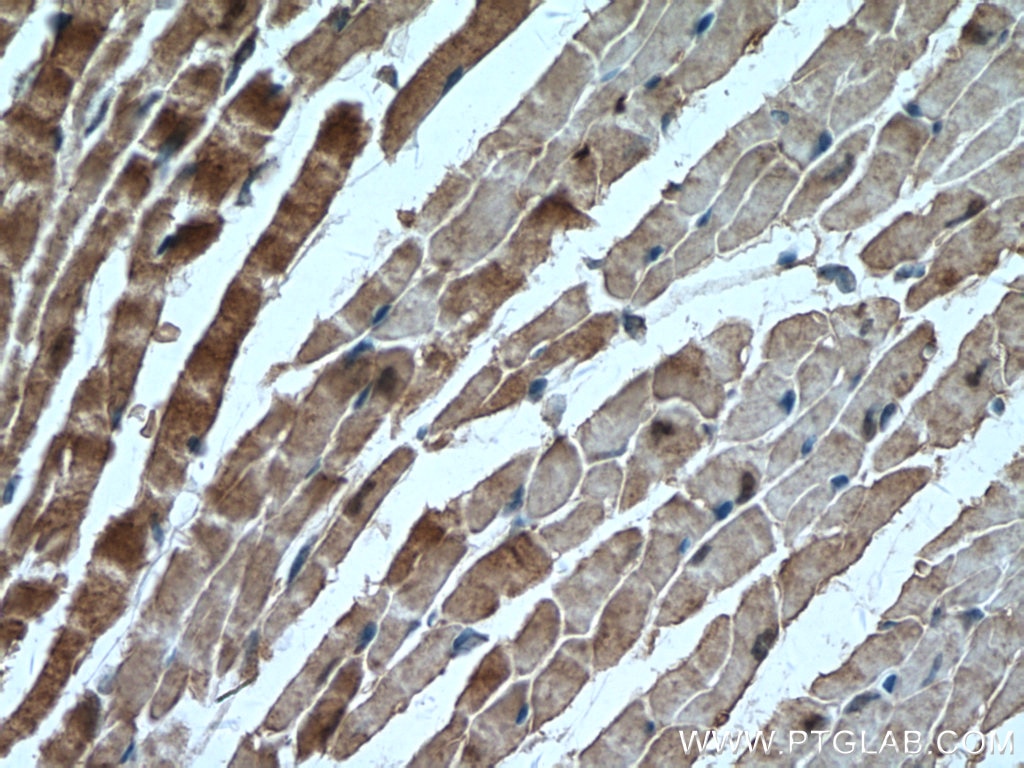AK1 Polyklonaler Antikörper
AK1 Polyklonal Antikörper für WB, IHC, ELISA
Wirt / Isotyp
Kaninchen / IgG
Getestete Reaktivität
human, Maus, Ratte
Anwendung
WB, IHC, ELISA
Konjugation
Unkonjugiert
Kat-Nr. : 14978-1-AP
Synonyme
Geprüfte Anwendungen
| Erfolgreiche Detektion in WB | Mausherzgewebe, humanes Herzgewebe, Maus-Skelettmuskelgewebe, Rattenherzgewebe |
| Erfolgreiche Detektion in IHC | Mausherzgewebe Hinweis: Antigendemaskierung mit TE-Puffer pH 9,0 empfohlen. (*) Wahlweise kann die Antigendemaskierung auch mit Citratpuffer pH 6,0 erfolgen. |
Empfohlene Verdünnung
| Anwendung | Verdünnung |
|---|---|
| Western Blot (WB) | WB : 1:500-1:3000 |
| Immunhistochemie (IHC) | IHC : 1:50-1:500 |
| It is recommended that this reagent should be titrated in each testing system to obtain optimal results. | |
| Sample-dependent, check data in validation data gallery | |
Veröffentlichte Anwendungen
| WB | See 5 publications below |
Produktinformation
14978-1-AP bindet in WB, IHC, ELISA AK1 und zeigt Reaktivität mit human, Maus, Ratten
| Getestete Reaktivität | human, Maus, Ratte |
| In Publikationen genannte Reaktivität | human, Maus, Ratte |
| Wirt / Isotyp | Kaninchen / IgG |
| Klonalität | Polyklonal |
| Typ | Antikörper |
| Immunogen | AK1 fusion protein Ag6890 |
| Vollständiger Name | adenylate kinase 1 |
| Berechnetes Molekulargewicht | 22 kDa |
| Beobachtetes Molekulargewicht | 22 kDa |
| GenBank-Zugangsnummer | BC001116 |
| Gene symbol | AK1 |
| Gene ID (NCBI) | 203 |
| Konjugation | Unkonjugiert |
| Form | Liquid |
| Reinigungsmethode | Antigen-Affinitätsreinigung |
| Lagerungspuffer | PBS with 0.02% sodium azide and 50% glycerol |
| Lagerungsbedingungen | Bei -20°C lagern. Nach dem Versand ein Jahr lang stabil Aliquotieren ist bei -20oC Lagerung nicht notwendig. 20ul Größen enthalten 0,1% BSA. |
Hintergrundinformationen
AK1(Adenylate kinase isoenzyme 1), also known as ATP-AMP transphosphorylase 1. It is located in cytoplasm. This protein is highly expressed in skeletal muscle, brain and erythrocytes. Certain mutations in this gene resulting in a functionally inadequate enzyme are associated with a rare genetic disorder causing nonspherocytic hemolytic anemia. Catalyzes the reversible transfer of the terminal phosphate group between ATP and AMP 1. Exhibits nucleoside diphosphate kinase activity, catalyzing the production of ATP, CTP, GTP, UTP, dATP, dCTP, dGTP and dTTP from the corresponding diphosphate substrates with either ATP or GTP as phosphate donor 2. Also catalyzes at a very low rate the synthesis of thiamine triphosphate (ThTP) from thiamine diphosphate (ThDP) and ADP. The molecular weight of AK1 is 22 kDa.
Protokolle
| PRODUKTSPEZIFISCHE PROTOKOLLE | |
|---|---|
| WB protocol for AK1 antibody 14978-1-AP | Protokoll herunterladen |
| IHC protocol for AK1 antibody 14978-1-AP | Protokoll herunterladenl |
| STANDARD-PROTOKOLLE | |
|---|---|
| Klicken Sie hier, um unsere Standardprotokolle anzuzeigen |
Publikationen
| Species | Application | Title |
|---|---|---|
J Proteome Res Data-Independent Acquisition Proteomics and N-Terminomics Methods Reveal Alterations in Mitochondrial Function and Metabolism in Ischemic-Reperfused Hearts | ||
Eur J Pharmacol Adenosine kinase (ADK) inhibition with ABT-702 induces ADK protein degradation and a distinct form of sustained cardioprotection. | ||
Cell Res Hierarchical activation of compartmentalized pools of AMPK depends on severity of nutrient or energy stress. | ||
EMBO J Aberrant DNA N6 -methyladenine incorporation via adenylate kinase 1 is suppressed by ADAL deaminase-dependent 2'-deoxynucleotide pool sanitation |
